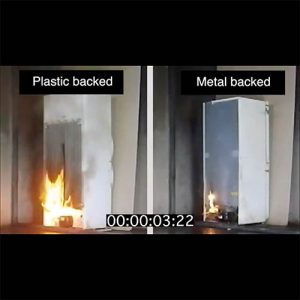Overheated wiring in a Hotpoint fridge-freezer has been identified by an expert witness as the most likely cause of the Grenfell Tower fire.
Dr John Duncan Glover, president and principal engineer at Failure Electrical LLC, was appointed to ‘look into the electrical aspects’ of the case. He said in his testimony to a Grenfell Tower Public Inquiry hearing that a bad crimp connection in the wiring of a Hotpoint FF175BP fridge-freezer was the most probable cause of the Grenfell Tower blaze in June 2017.
Dr Glover said this meant that wires were not gripped together tightly, which led to the overheating.
Glover said: “The overheating in the crimp starts the fire. It overheats, it glows, it ignites. You have glowing electricity, luminous electricity, flowing through those voids. It creates heat that ignites the insulation on the wires before you have a short circuit that would trip the circuit breaker.”
Dr Glover also told the inquiry that in his opinion steel backing would help to contain an internal fire within the refrigerator for longer than a plastic backing. The FF175BP fridge-freezer in question, which was manufactured in October 2008, was built with a plastic back.
Whirlpool announced back in March of this year that all of its UK refrigeration appliances would have metal backs by Q3 2018. Whirlpool fridges, freezers, and fridge-freezers – including Hotpoint and Indesit – will have solid metal or aluminium laminate flame-retardant back panels.
After the plastic-backed fridge-freezer was linked to the fire, GDHA, Electrolux, and Gorenje followed Whirlpool’s example. However, metal backings on refrigeration appliances are still not a legal requirement in the UK, unlike in the US.

Speaking to kbbreview after the inquiry’s hearing, Whirlpool – Hotpoint’s parent company – said: “Plastic has been used in the manufacture of the majority of refrigerator back panels throughout the industry for decades, and fully complies with all legal, safety, and regulatory requirements.
“The industry is committed to constantly evolving standards to keep improving products – and it has assisted the British Standards Institution and other experts in driving forward a new safety standard for refrigeration appliances, which is due to be introduced next year.
“As part of this process, we have for some time been implementing manufacturing changes so that all our refrigeration appliances are fully compliant with the new safety standard far ahead of its expected introduction next year.”
Phil Buckle, chief executive of Electrical Safety First, said he wanted to read the full report before commenting in detail, but told kbbreview: “Electrical Safety First has long argued for manufacturers of plastic-backed fridge-freezers – which can pose a significant fire risk and lead to large, rapidly developing fires – to use safer materials. Non-combustible backs provide better containment of fire, whether that’s from ignition within the product or from an external source.
“We also recognise that for many people – particularly vulnerable groups – replacing a fridge-freezer isn’t immediately economically viable. So, to provide immediate support for consumers, we have developed a microsite – www.whitegoodsafety.com – to offer advice and help in using fridges and freezers safely.
“And we continue to advise people to always register a new item with the manufacturer, to ensure they can be easily contacted if a product recall is required.”
In response to Dr Glover’s findings, Which? has called for all plastic-backed refrigeration appliances to be removed from sale. Alex Neill, Which? managing director of home products and services, said: “The claims from this inquiry back up our own findings, which show that plastic-backed fridges and freezers put lives at risk by contributing to a fire spreading more quickly.
“Hundreds of fridges, freezers and fridge-freezers with plastic backs currently on sale in shops around the UK are a potential fire risk and should be urgently removed from sale.”